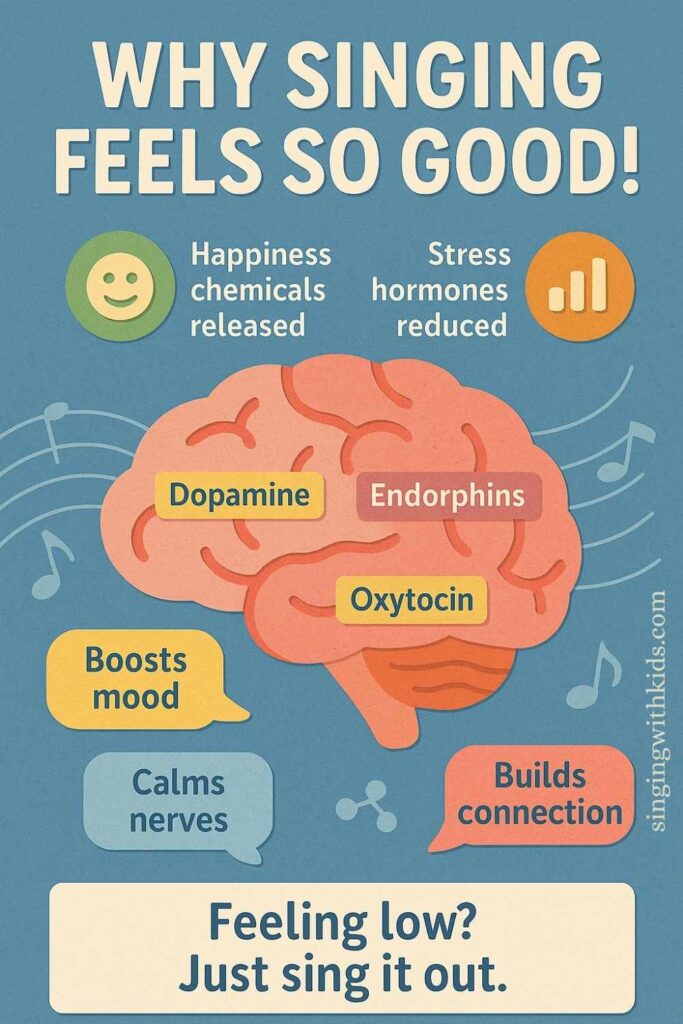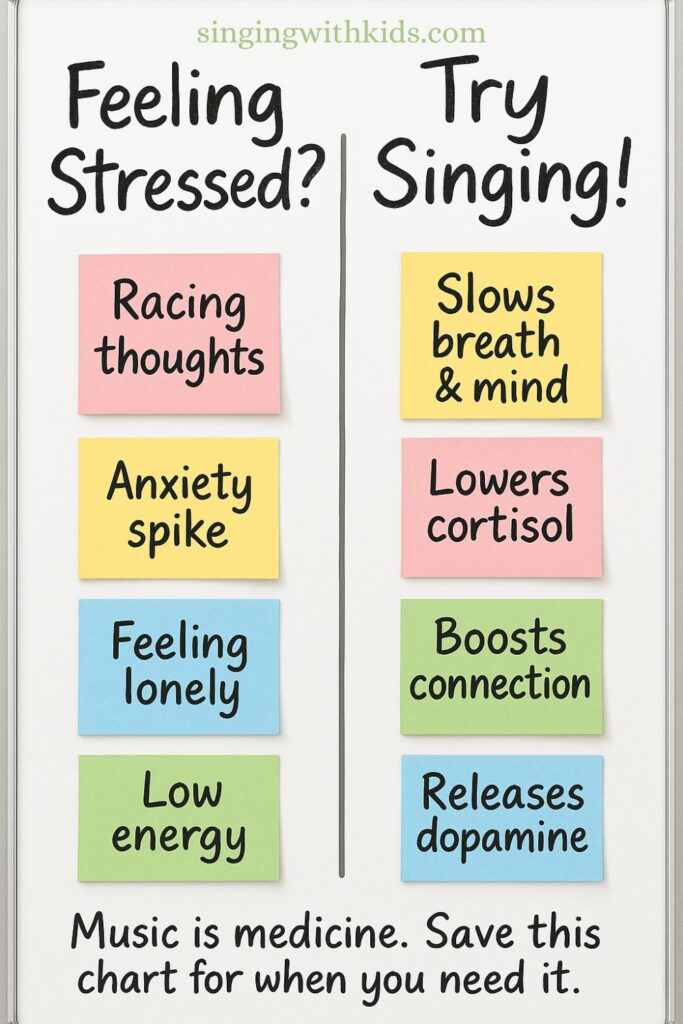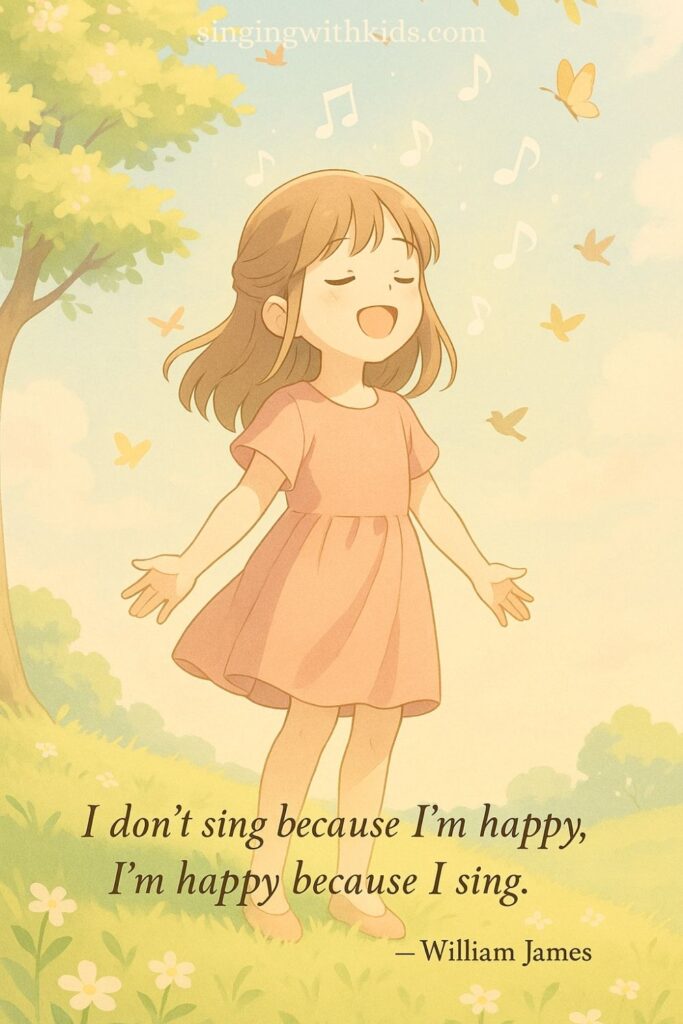Bad Day? Just Sing! Discover the Science of Singing and Happiness
Ever had one of those days where nothing seems to go right? The toast burns, the Wi-Fi won’t connect, your child’s sock goes mysteriously missing… again. Before you reach for that third coffee or scroll social media for the hundredth time, I’ve got a surprisingly simple solution:
Sing.
Yes, sing. Out loud. Off-key. In your kitchen, in the car, in the shower—wherever you are. Because singing can bring happiness to people in the most unexpected, magical ways.
“The only thing better than singing is more singing.” — Ella Fitzgerald
As a singing teacher, I’ve witnessed firsthand how singing genuinely uplifts people’s spirits. Singing doesn’t just create beautiful sounds—it creates happiness.
I’ll never forget the day Sarah walked into her lesson visibly upset, burdened by school stress and teenage worries. She barely spoke, dragging herself to the piano. Yet, within minutes of singing her favorite song, Sarah’s mood transformed. Her eyes sparkled, her voice strengthened, and by the end, she left smiling broadly, completely uplifted. That’s the magic of singing—turning sadness into joy.
If you’ve ever wondered, “Why does singing make me feel happy?” you’re not alone. Let’s explore this together.
Table of Contents
Why Does Singing Make Me Feel Happy?
There’s actual science behind that joy you feel when belting out your favorite tune. Singing releases a cocktail of feel-good chemicals: endorphins, dopamine, serotonin, and even oxytocin (that lovely bonding hormone). It’s like a happiness smoothie for your brain!
Neurologically speaking, singing activates both the left and right hemispheres of the brain—language and creativity, logic and emotion—working together in harmony (pun fully intended). This blend reduces cortisol (your stress hormone) and increases oxygen flow, which is why singing feels euphoric and relaxing all at once.
“Why do I feel so good when I sing?”
Because your brain is literally throwing a happiness party!
How Does Singing Improve Mental Health?
Whether you’re dealing with anxiety, low mood, or just a bit of stress from juggling all-the-things, singing can be a form of therapy. In fact, singing therapy is used in music therapy practices around the world to treat everything from depression to trauma recovery.
Singing for happiness isn’t just a catchy phrase—it’s a real mental health tool. And the best part? It’s free and always available. No appointments needed.
Here’s how singing helps mental health:
-
Regulates breathing, which calms the nervous system.
-
Promotes mindfulness, helping you focus on the present moment.
-
Builds confidence, especially when practiced regularly.
-
Provides emotional release, a safe outlet for feelings.
-
Encourages connection, especially in group singing or choirs.

Singing with Kids: Joy, Confidence, and Connection
Kids are natural singers—have you noticed? They hum while coloring or building Lego towers, belt out movie soundtracks at full volume, and make up songs about absolutely everything. This natural musicality is a gift—and one we should nurture.
And we should encourage that. Singing helps children:
-
Build emotional intelligence (expressing feelings through music).
-
Improve memory, language and communication skills.
-
Boost self-esteem and confidence.
-
Cope with anxiety and stress in healthy, joyful ways.
Next time your child feels overwhelmed or grumpy, invite them to sing with you. Turn chores into a sing-along. Make homework a humming zone. Even car rides become magical when they’re filled with laughter and the soundtrack from Encanto or The Greatest Showman on repeat.
Need a little help? Try this fun children’s singing game to learn pitch: Play a note on a keyboard or piano app and ask your child to “match it” with their voice—like a musical hide and seek. (Bonus: sneak in some music education without them realizing it!)
Singing for Adults: Therapy in Disguise
Let’s be honest—most of us stopped singing somewhere between middle school and “real life.” We got self-conscious. We got busy. We forgot how powerful it feels to just… sing.
But it’s not too late.
Even simple steps like:
-
Singing while doing the dishes
-
Humming during your daily walk
-
Karaoke night at home
- Car sing-alongs with the family
-
Joining a local choir or community musical theater
-
Taking a weekly singing lesson (yes, even online!)
…can do wonders for your mood, confidence, and mental clarity. You don’t need to be perfect. You just need to sing.
“Is singing a form of therapy?”
Absolutely. Think of it as emotional yoga with a soundtrack.
In fact, studies have shown that group singing increases happiness levels and lowers symptoms of depression. Just an hour of choir practice can leave people feeling more connected, uplifted, and energized than before.

Feeling stressed or in need of a happiness boost? Singing might be the answer—and we’ve created the perfect way to make it part of your daily life!
Download our free, beautifully designed 30-Day Singing for Happiness Challenge PDF and start lifting your mood, one joyful note at a time. This printable guide will help you build confidence, connect with your emotions, and share smiles through song.
✨ Real Stories of Transformation Through Singing
Over the years, I’ve witnessed how singing can change lives in beautiful, unexpected ways. Let me share a few stories that show just how powerful this simple act can be.
I once knew a boy named Max, age 8, who was painfully shy—barely speaking at school. But put on a Moana soundtrack and suddenly he was front and center, singing with passion and power. His teachers noticed a change. So did his parents. His voice helped unlock his confidence.
Linda, a new mother facing postnatal depression, joined a local community choir. There, she found more than just music—she found healing, friendship, and a safe space to feel seen. Regular choir participation brought Linda a powerful sense of community and happiness. Singing in harmony significantly alleviated her symptoms, helping her recover and reconnect positively with her family and life.
Jack, a retiree, had never sung before. Skeptical but curious, he gave it a try. What started as a hobby quickly became a passion. He felt energized, happier, and more emotionally connected. Singing gave him a renewed sense of purpose.
Then there’s Maria, a mom of three who swears karaoke Tuesdays saved her sanity during the pandemic. “We sang everything from Disney hits to 80s rock,” she laughs. “I remembered how good it felt to just be silly, loud, and joyful with my kids.”
And isn’t that what singing really is?
Not perfection. Not performance.
Just joy.
Why Singing Feels Euphoric
“I don’t sing because I’m happy, I’m happy because I sing,” said renowned psychologist and philosopher William James. This powerful statement highlights a profound truth: our actions often shape our emotions. Singing creates happiness because it:
- Releases Endorphins: Singing triggers the release of natural mood-enhancing chemicals, providing instant joy.
- Reduces Stress and Anxiety: The deep breathing involved in singing calms your nervous system, alleviating anxiety and promoting relaxation.
- Creates Social Bonds: Group singing connects people emotionally, creating a sense of belonging and reducing loneliness.
As American jazz legend Sarah Vaughan beautifully put it, “When I sing, trouble can sit right on my shoulder and I don’t even notice.” Singing helps us momentarily escape our worries, immersing us in pure joy and positivity.

Are People That Sing Happier?
Research says yes! Singing benefits emotional health significantly. According to HowStuffWorks, music actively boosts mood and mental well-being. Organizations like Sing Up Foundation emphasize how singing enhances mental health through emotional release and community connection.
How Singing Is Beneficial to a Person:
- Boosts self-esteem and confidence (Opera North).
- Improves mental health and emotional resilience (Menninger Clinic).
- Enhances social bonds and feelings of belonging (Choral Canada).
Singing Your Way to Happiness
If you’ve wondered, “Why do I feel so good when I sing?” it’s because singing deeply connects you with your emotional well-being, creating immediate joy. Singing regularly can improve your psychological health profoundly, reduce stress, and boost overall life satisfaction.
💡 Key Takeaways: Singing = Instant Happiness
-
Singing lifts your mood and lowers stress
-
Singing is a natural, accessible form of therapy
-
Singing strengthens emotional bonds—especially in families
-
Singing builds confidence and supports mental health
- Music and singing can provide lasting emotional support and community connections.
- Regular singing helps manage stress and anxiety, enriching your life.
Whether you’re 5 or 75, it’s never too late—or too early—to embrace the joy of singing.

Final Note: Can Music Bring Happiness?
Yes. Unequivocally, yes.
Music, and especially singing, touches parts of us that words alone can’t reach. Whether you’re five or fifty-five, your voice is a gift—not just for others to hear, but for you to feel.
So next time you’re having a bad day, don’t bottle it up.
Sing it out. Loud. Soft. Silly. Soulful.
Turn up the music. Open your heart. And let happiness echo through every note.
Feeling Inspired? Share the Joy!
If this post made you smile, sparked a memory, or encouraged a car karaoke session—please share it with a friend! 🎶 Let’s spread the word that singing can improve mental health, and that every voice matters.
🔗 Share on Facebook | Pinterest | Twitter
FAQs People Ask (and You Might Too)
-
Why does singing relax me?
Singing slows your breathing and heart rate, helping to calm your nervous system and reduce anxiety. -
How does singing therapy work?
Singing therapy combines voice, breathing, and emotional release to support mental wellness, often led by a certified music therapist. -
Are people that sing happier?
Yes! Studies show regular singers report higher levels of life satisfaction and emotional wellbeing. -
Why do I feel better when I sing?
It’s not just in your head—it’s in your brain chemistry. Singing triggers natural mood-boosting chemicals that help lift your spirits.
Your Turn:
Have you experienced how singing can bring happiness to people, including yourself? I’d love to hear your story! How has singing influenced your happiness and well-being? Comment below, share your experiences, and inspire others to embrace the joy of singing.










